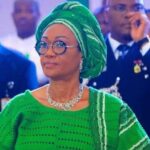How Remi Tinubu Spent N701 Million in Three Months
How Remi Tinubu Spent N701 Million in Three Months

In recent months, public scrutiny has intensified around the substantial expenses associated with the foreign trips of Remi Tinubu, the First Lady of Nigeria. Reports have revealed that a staggering N701 million was allocated for these trips within a span of just three months. This revelation has sparked debate and concern regarding the allocation of government funds and the broader implications for national finances.
The Expenditure Breakdown
According to the figures released, the N701 million expenditure encompasses various costs associated with international travel, including accommodation, transportation, security, and diplomatic engagements. This amount raises questions about the necessity and scale of these trips, particularly in a time when many Nigerians are facing economic hardships.
Public and Political Reactions
The expenditure has drawn a mix of reactions from the public and political figures. Critics argue that the amount is exorbitant and could have been better utilized for pressing national issues such as healthcare, education, and infrastructure development. They contend that the high costs associated with these trips reflect a disconnect between the government and the everyday challenges faced by citizens.
On the other hand, supporters of the First Lady argue that such trips are crucial for fostering international relationships, promoting national interests, and participating in global forums. They assert that the trips could have significant long-term benefits for Nigeria, including enhanced diplomatic ties and potential economic opportunities.
Implications for Governance and Accountability
The significant expenditure on foreign trips highlights the need for greater transparency and accountability in the management of public funds. It underscores the importance of clear guidelines and oversight mechanisms to ensure that government spending aligns with national priorities and offers tangible benefits to the populace.
Future Considerations
In light of this expenditure, there may be increased calls for a comprehensive review of travel budgets and protocols for high-ranking officials. Ensuring that such trips are conducted with utmost efficiency and necessity will be crucial in restoring public trust and ensuring that government spending is both justified and beneficial.
The debate surrounding Remi Tinubu’s foreign trips is a reminder of the broader issues of fiscal responsibility and governance. As Nigeria continues to navigate its economic and social challenges, finding a balance between diplomatic engagements and domestic needs will be essential for sustainable development and public confidence.
TRENDING SONGS
 NNPC Boss Ojulari Bags UK Energy Institute Fellowship
NNPC Boss Ojulari Bags UK Energy Institute Fellowship
 Shock in Anambra: Bride Disappears Moments Before Wedding
Shock in Anambra: Bride Disappears Moments Before Wedding
 Nigerian Woman Returns ₦330 Million Accidentally Credited to Her Account
Nigerian Woman Returns ₦330 Million Accidentally Credited to Her Account
 APC Don Reach Morocco?’ VeryDarkMan Reacts to Seyi Tinubu Poster
APC Don Reach Morocco?’ VeryDarkMan Reacts to Seyi Tinubu Poster
 Bride Breaks Down in Tears as Wedding Meals Were Kept Secretly While Guests Go Home Hungry
Bride Breaks Down in Tears as Wedding Meals Were Kept Secretly While Guests Go Home Hungry
 Odogwu by Day, Robber by Night: How Marriage Joy Turned Into Tragedy
Odogwu by Day, Robber by Night: How Marriage Joy Turned Into Tragedy
 Nigerian Officials Allegedly Pocket N4–6B Weekly Through Smuggling Cartels at Seme–Badagry Border
Nigerian Officials Allegedly Pocket N4–6B Weekly Through Smuggling Cartels at Seme–Badagry Border
 Ahmad Yerima: Naval Officer to Face No Sanctions After Clash with Wike – Matawalle
Ahmad Yerima: Naval Officer to Face No Sanctions After Clash with Wike – Matawalle
 Trending Video: Muslim Man Joins Wife in Hallelujah Challenge ‘Dress Like Your Miracle’ Night
Trending Video: Muslim Man Joins Wife in Hallelujah Challenge ‘Dress Like Your Miracle’ Night
 Woman Seeks Advice as Late Brother’s Wife Refuses to Mourn Him Following His Death With Alleged Mistress
Woman Seeks Advice as Late Brother’s Wife Refuses to Mourn Him Following His Death With Alleged Mistress
Share this post with your friends on ![]()













